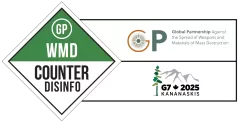BWC Article X success stories
COOPERATION AND ASSISTANCE
Article X of the Biological Weapons Convention (BWC) commits states parties “to facilitate, and have the right to participate in, the fullest possible exchange of equipment, materials and scientific and technological information for the use of bacteriological (biological) agents and toxins for peaceful purposes.” The provisions of Article X recognise that in addition to the BWC’s provisions on disarmament, scientific cooperation and development assistance are essential to ensure that biological knowledge, tools and material are shared to promote the security of states parties from infectious disease threats emerging within and outside their territories. There have been multiple Article X success stories, including from Senegal, Laos, Uganda, Ghana and Thailand.
SENEGAL
The establishment in 2018 of a Public Health Emergency Operations Center in Dakar received support from the Global Health Security Agenda, the US Defense Threat Reduction Agency, the US Centers for Disease Control and Prevention, the African Union Center for Disease Control, and the World Health Organisation. It now successfully acts as a focal point for disease analytics, diagnostic testing and information sharing across the West African region. The Public Health Emergency Operations Center has been utilised during the COVID-19 pandemic, recent Chikungunya outbreaks and following a mass casualty event involving Senegalese nationals during a Hajj stampede.
LAOS
Nearly US $1.9 million in scientific assistance has been provided to Laos to support health security in response to the COVID-19 pandemic. A tabletop exercise in Vientiane in March 2020, sponsored by the US Centers for Disease Control and Prevention and the US Defense Threat Reduction Agency included representatives from across the government of Laos and its public health bodies, as well as local United Nations officials and the World Health Organisation. The exercise built on long-term scientific assistance provided to Laos to support best practices in health security and emergency management.
UGANDA
A partnership between the US Centers for Disease Control and Prevention, the US Defense Threat Reduction Agency, and the government of Uganda has resulted in a multi-year programme to strengthen biosafety and biosecurity in the country. In the context of regional instability in East Africa, the partnership has developed infrastructure to safeguard dangerous pathogens used for public health research, including physical site protections and workforce training on dual-use research of concern, and it has supported the development of laboratories and Public Health Emergency Operations Centers, including in Uganda.
GHANA
A partnership between Global Affairs Canada, the Canadian Food Inspection Agency, and Ghanaian Veterinary professionals successfully established biological containment laboratories in Accra, Pong-Tamale and Takoradi. The state-of-the-art modular laboratories were initially designed to support the detection of anthrax, avian influenza and African swine fever in animal populations, but as the COVID-19 pandemic reached Ghana, they were adapted to also provide frontline diagnostics to local health authorities.
THAILAND
Diagnostic equipment provided by the US Cooperative Threat Reduction Program to the Chulalongkorn University in Thailand facilitated the first diagnosis of a case of SARS-CoV-2 outside of Wuhan, China in January 2020. Early detection and reporting of the international spread of the virus supported early response planning by international health bodies.
KEY MESSAGES
- The successes of recent scientific cooperation underscores the crucial role of Article X in global biological security regimes.
- Scores of programmes have shown the benefits of effective collaboration to build essential infrastructure, share best practices, and pool expert knowledge across country networks to ensure the international community’s shared protection against infectious disease threats wherever they might emerge.
